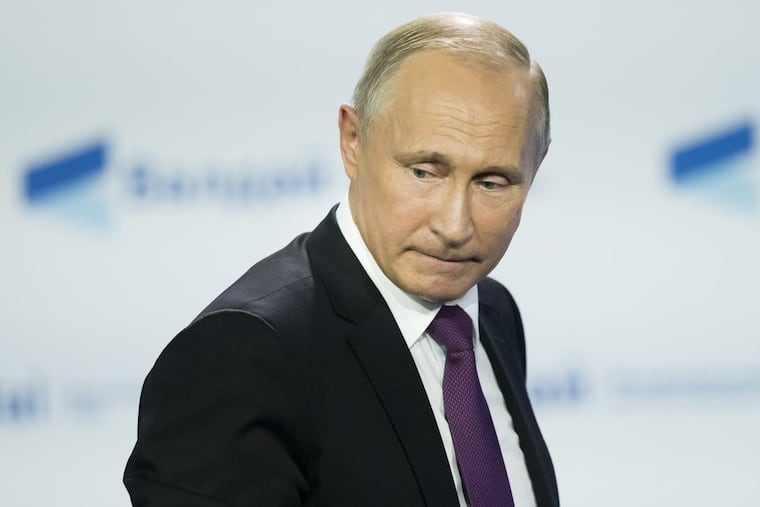Why Putin hated Hillary and loved Trump | Trudy Rubin
Russian opposition journalist lays out Putin's thirst for revenge against Clinton and hopes to undermine U.S. democracy.

I can't think of anyone better than Yevgenia Albats to tell the back story of why the Russians hacked the U.S. election and flooded Facebook and Twitter with fake political ads.
Albats is the prize-winning editor-in-chief of the last independent Russian political weekly, the New Times, and an anchor with Moscow's last independent radio station, Echo Moskvy. This week she is the inaugural writer-in-residence at the University of Pennsylvania's Perry World House and Kelly Writers House.
It takes phenomenal courage to pursue independent journalism these days in Moscow. One of Echo Moskvy's correspondents was stabbed in the neck two weeks ago. And a few years ago, when Albats sent her Subaru to be serviced, the mechanics found a plastic package under the hood containing a Nokia cellphone and plastique explosives. Seven months ago, the bolts on her tires were unscrewed.
The Committee to Protect Journalists lists 58 Russians killed since 1992 while covering politics, crime, war, and human rights, with an additional 24 murdered for unknown motives.
So it's a far cry from the heady days in 1990 when Mikhail Gorbachev's glasnost policy loosened press restrictions, and gutsy journalists like Albats seized the chance to start revealing Soviet secrets. That year I shared an office with her at Moscow News, the newspaper at the forefront of glasnost, where I was an exchange journalist, as she started writing about the KGB. She later wrote the seminal book The State Within a State: KGB and Its Hold on Russia.
Today, says Albats, the KGB has been reincarnated big time in its new form under Vladimir Putin. She says Russia has become a corporation where security, the economy, and virtually all media are controlled by intelligence agencies and the military, from which all top officials now come. Putin, of course, is a former KGB colonel.
Understanding that KGB dominance helps answer the big question: Why did the Kremlin try to hurt Hillary Clinton and presumably help Donald Trump?
Albats cites two key reasons: Putin's yen for revenge against Clinton and his desire to discredit the U.S. ballot. The Russian leader's KGB mentality is the key to both.
Putin believed Washington was behind the so-called color revolutions in several ex-Soviet republics in the 1990s, while Bill Clinton was president. He held Hillary personally responsible for massive protests in Russia in 2011 and 2012 against unfair elections. And he "absolutely believed" the United States organized a popular uprising in Kiev in 2014 that led to the ouster of a Putin-backed Ukrainian president.
"Putin thought, 'You, Clinton, did what you did in my backyard. I'll show you what I can do to you,'" says Albats. "They can't comprehend the idea that people might rise up out of convictions."
Moreover, the Kremlin "was afraid of Hillary" because they believed she would maintain U.S. sanctions imposed after Russia's invasion of Ukraine. "There was constant anti-Clinton and pro-Trump propaganda on Russian TV in 2016," she recalled. The Kremlin was convinced Trump would lift the sanctions, which had really hurt the ruling elite.
But the Kremlin also believed U.S. polls and thought Trump couldn't win the election. So Putin's second goal, Albats says, was "to bring about chaos. Putin believes in managed chaos." The aim was to exacerbate divisions in U.S. society as well as harm the reputation of the woman he thought would win.
The Russian leader also wanted to message to his own people that "U.S. democracy doesn't exist, or fair elections, and that freedom leads to chaos." The leading Russian talk show host, Dmitry Kiselyov, a mouthpiece for Putin, told his audience in September 2016, on state-controlled TV, that the U.S. establishment might kill Trump because he was ready to come to an agreement with Russia. In other words, the U.S. system is no different from theirs.
When Trump won, the Russian leadership was ecstatic. "There were celebrations with champagne in the state Duma," Albats says, and Putin's elite thought sanctions would end immediately, and they could shop again elsewhere in Europe and vacation in the south of France.
So Putin was shocked that Trump didn't immediately deliver. "They were stunned because in their psyche, Trump is the most important man on Earth and he is constrained by who – by Congress? They don't understand that Trump can't just call these people and tell them to lift sanctions. In Russia, the KGB would just put a camera in an apartment" of key legislators and use blackmail.
Although Putin has been thwarted in his expectations of Trump, this doesn't mean he won't try to meddle in U.S. politics again.
As Albats points out, Russian meddling is about more than Trump or Clinton. It is about Putin's hostility toward the U.S., which he considers Russia's Enemy No. 1. Hacking and manipulation of social media are but one dangerous tool in his effort to weaken his adversary.
So long as Trump refuses to recognize that reality and devise a counter-strategy, he is helping Putin continue this dangerous game.